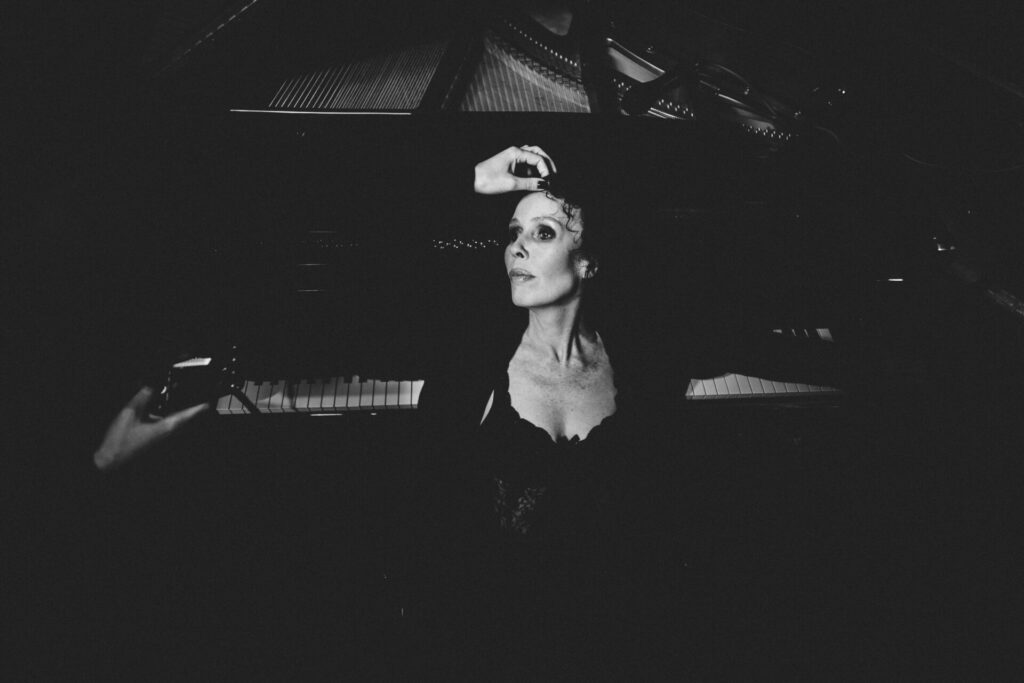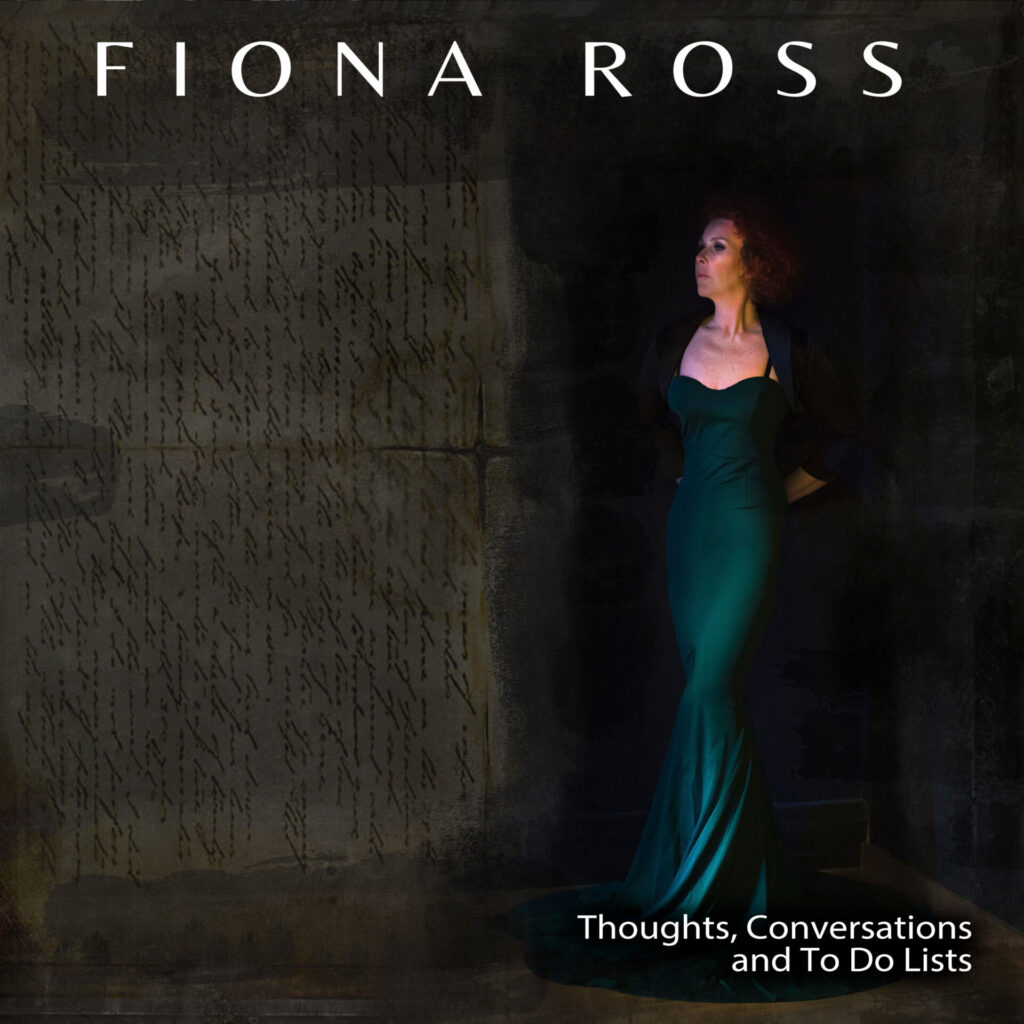Multi Award Winning Jazz singer-songwriter Fiona Ross undertakes the difficulty of capturing the everyday – via both its birds-eye view and its sharp, minute detail – on her new album Thoughts, Conversations and To Do Lists – available on April 28th.
The 14-track album, which Ross wrote, orchestrated, and produced, is a collection of various themes that mirror Ross’ everyday life. While some songs are active and have a lot going on at once, others are quieter, more introspective, and reflect Ross’ state of mind. Check out the exclusive interview below:

1. Can you tell us a bit about where you come from and how it all got started?
FIONA ROSS: I was born in the UK and live in London, but have strong roots with Scotland and Ireland, as my Father was Scottish and my Mother was of Irish descent. Fiona and Ross are very traditional Scottish names and my middle name is actually Irish. I had a kind of crazy stage Mum, so I have been working in the Creative Industry since I was very small. I initially trained in dance, drama and music and I went to a performing arts school where my first jobs were mainly on the stage – Musical Theatre, Opera and some Film work too. But I was also classically trained as a pianist and vocalist and I have worked as a session musician and composer for many years. So, basically I’ve always worked in the Creative industry in some way. But about seven years ago, it became obvious that it was the right time to start doing my own work and developing myself as an artist in my own right. I released by first album in 2017 and having just released my 7th album, there is no going back now!
2. Do you think is it important for fans of your music to understand the real story and message driving each of your songs, or do you think everyone should be free to interpret your songs in their own personal way?
FIONA ROSS: Love this question! I was talking to another artist about this recently. When she performs her songs, she deliberately does not talk about the songs beforehand because she wants the audience to feel completely free to interpret them in their own way. I love that. When I am performing, I do introduce most of my songs and explain a little about them, as I feel in a live situation, some of the stories behind the songs are interesting. But I do hope that my lyrics make sense and that people will connect to them through their own experiences and that they can relate. I write about things that I hope everyone can connect to in their own way.
3. Who were your first and strongest musical influences?
FIONA ROSS: I had such a wonderfully rich and diverse musical upbringing. I was always inspired by the great songwriters I was exposed to, through my older brother such Rickie Lee Jones, Kate Bush and Billy Joel. As a teenager, Prince and Stevie Wonder were huge influences along with some the great vocalists such as Whitney Houston, Anita Baker, Chaka Kahn and of course Aretha Franklin. I was inspired by my Dad’s Nina Simone and Ella Fitzgerald records from a young age but Jazz made a real impact on me when I was about 12, when I was first introduced to Billie Holiday and Oscar Peterson. There are three artists that I listen to everyday – Earth, Wind and Fire, Hiromi and Michel Camilo. Their music keeps me sane. Mostly. I continue to be inspired by all of these artists and more and so much great new music that is around today.
4. What do you feel are the key elements in your music that should resonate with listeners, and how would you personally describe your sound?
FIONA ROSS: My sound is a little tricky to define because sitting under the heading of Jazz can mean so many things. You will find all sorts of influences and grooves throughout my work and hopefully everyone will find something they enjoy whether you are into Jazz, contemporary jazz, singer/songwriter etc. But I think the elements that resonate with my audience is that my music is relatable. I write about parts of our lives that I think most of us have experienced at some point whether that is struggling with relationships, self-confidence, paying bills and fake news.

5. On the contrary, what would you consider a successful, proud or significant point in your life or music career so far?
FIONA ROSS: Success for me comes in many different shapes and sizes, but knowing someone enjoys my music, that it connected with them, is something I find hugely rewarding. If I have made someone smile, made someone feel they are not alone, even if it is for just one moment, then that is a success.
6. Do you feel that your music is giving you back just as much fulfillment as the amount of work you are putting into it or are you expecting something more, or different in the future?
FIONA ROSS: Honestly, I have no expectations and music is just something I have to do. I don’t think I could function without it. I am always surprised, and grateful that people enjoy my music. I don’t take anything for granted and it really is at times quite overwhelming when people tell me they felt really connected to music. I had a performance only the other week and someone in the audience came up to me afterwards, thanking me and explained that she was a psychotherapist and said ‘you touched a lot of people tonight and I say that as a professional. Keep doing what you do.’ I always, of course, hope to make a connection with the audience and hope they feel something, but this comment meant the world to me and was hugely significant to me.
7. For most artists, originality is first preceded by a phase of learning and, often, emulating others. What was this like for you? How would you describe your own development as an artist and music maker, and the transition towards your own style, which is known as contemporary JAZZ?
FIONA ROSS: I believe my style is just a culmination of the many influences I have had throughout my life. I have never tried to be like anyone else, although of course admire many. As a child I wanted to be Aretha Franklin, but I did finally accept, sadly, that I couldn’t be her when I was a teenager. I have always just tried my best to be authentic and real. Having spent many years training and performing in the theatre and pretending to be someone else, being myself is very important to me. but I just go with the flow and I don’t try to be anything, just true to myself.
8. What’s your view on the role and function of music as political, cultural, spiritual, and/or social vehicles – and do you try and affront any of these themes in your work, or are you purely interested in music as an expression of technical artistry, personal narrative, and entertainment?
FIONA ROSS: I love this question! I could, easily write an essay here, but I believe music is an incredibly powerful tool and its power is so often underestimated. Music has been used throughout history as a way to communicate and invigorate the heart and mind in a range of ways. For me, I never write with any intention or a plan. I sit down and write about how I am feeling at that time. So sometimes this can be a specific personal experience like a simple (or not) relationship break down or a conversation I have had with someone. In my recent album, I wrote a song about my frustration with fake news and how hard it is to find the truth in the news, which was a direct result of my interest in American Politics and the way social media can be used as negative force. But ultimately, as artists, we need to write about whatever we are feeling, whatever we are passionate about…it is where stories and experiences can be shared.
9. Could you describe your creative processes? How do usually start, and go about shaping ideas into a completed song? Do you usually start with a tune, a beat, or a narrative in your head? And do you collaborate with others in this process?
FIONA ROSS: I wish I could give you something defined here, but the fact is, I just sit down at my piano, on my own and write whatever comes into my head at that time and this always varies. So sometimes it might be a chord progression, a bass line, a groove or a brass line. It’s rarely lyrics first although on occasion it has been a melody line and lyrics at the same time, but very quickly followed by a chord progression. I really just go with the flow at the time. I don’t collaborate with anyone in the writing process and maintain some isolation when I am writing. I deliberately don’t listen to any music while I am in my writing phase. I want the ideas to be as new and fresh as possible and don’t want to be unintentionally influenced.
10. What has been the most difficult thing you’ve had to endure in your life or music career so far?
FIONA ROSS: Working in this industry is so challenging and you have to be so resilient. But for me, the hardest thing is trying to balance my insecurities with being strong and confident. The constant up and down of feeling empowered and believing you can achieve anything if you work hard enough with the insecurities of being a creator, opening a door to vulnerability, where you strive for unachievable perfection and never feel you are enough.
KEEP IN TOUCH:
FACEBOOK | INSTAGRAM | TWITTER | SPOTIFY | BANDCAMP | WEBSITE | YOUTUBE

Photo Credit: Monika S Jakubowska, Steven Tiller, Ron Milsom, Stefan Ferroll
